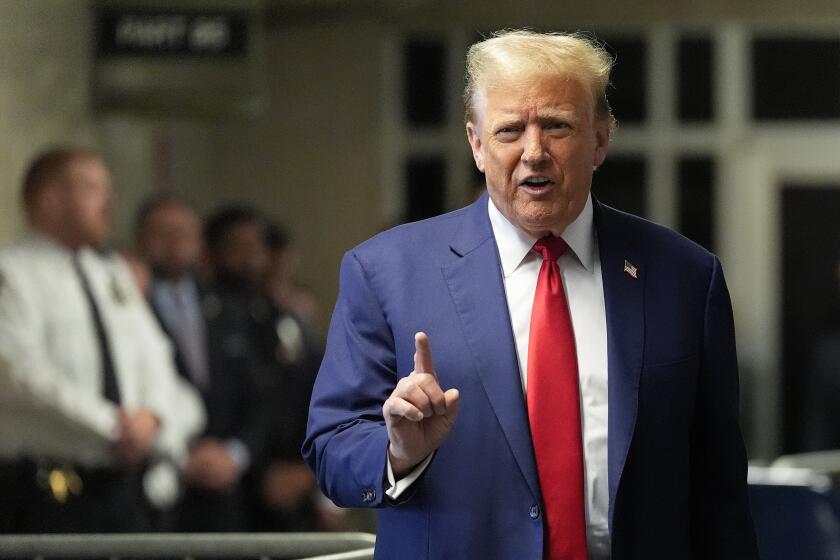California politics, and what we don’t know
Quick, don’t Google, just answer: Who represents you in state government?
This is the question I roamed about asking at a party in my diverse and politically progressive neighborhood of Venice. The room was filled with people who worry openly about the water they drink, the fuel in their cars, the contents of their compost. Some of them had canvassed for Barack Obama or written checks to his campaign. Others were busy trying to overturn Proposition 8, the 2008 ballot initiative that banned gay marriage in California. They were unanimously baffled by what’s happening in Arizona, where Gov. Jan Brewer recently signed a bill requiring “suspicious” people to prove their citizenship if stopped by police.
I did not expect everyone to answer accurately. It’s arcane, this business of lawmaking in Sacramento, where legislators in various districts debate everything from hunger to cargo theft to the invasion of the glassy-winged sharpshooter and its impact on viticulture. But the results were far worse than I’d imagined.
Not a single person in the room that night could name a state legislator; none had heard the names of the two who represent us in Venice, state Sen. Jenny Oropeza and soon-to-be-termed-out Assembly member Ted Lieu. No one knew the name of anyone running for Lieu’s seat. Never mind that our neighbor, Nick Karno, who served for years on the Venice neighborhood council, is among them.
One young man in the room, who runs a tea-catering business and can rattle off the botanical names of every plant worth steeping in a pot, was even unaware that California has a bicameral Legislature and that one of those legislative chambers is called the Assembly.
The next day, I began extending the experiment to my friends. The ones who could hazard a guess were either journalists or people actively working with state agencies. The rest — voters, all of them — failed. Then I moved on to strangers on the street. They all flunked.
One night at a local restaurant, I asked the bartender. “State senator?” he said. “Sure. Let’s see. Barbara Boxer?”
“She’s our U.S. senator,” I reminded him.
“Oh,” he said. “There’s a difference?”
I kid you not. Try it yourself.
It’s hard to say what’s to blame for this, whether it’s simple voter apathy, the individual narcissism of the U.S. electorate or something creepier, like a Trilateral Commission plot to trivialize local governance by making it boring as all get out.
What’s more certain is the effect of such widespread civic illiteracy on democracy. A statewide survey conducted in May by the Public Policy Institute of California found that 80% of registered voters disapprove of what’s going on in the state capital. Of course, most of those unhappy people haven’t done much to change that. In California, where most state districts trend overwhelmingly toward one party or the other, it is primary elections like the one being held Tuesday that determine who is elected. And the last primary election, in June 2008, drew a pathetic 19.75% of eligible voters, according to the secretary of state.
Linda Strean, the policy institute’s assistant director of communications, says that she doesn’t know of a survey quizzing the electorate on the names of their state legislators, though she thinks one might be a good idea. But “those voter turnout numbers,” she says, “are chilling.”
And for an example of what such chillingly low voter turnout numbers augur, there’s Arizona. “An ever-smaller electorate is making decisions about who’s going to be representing them in Arizona’s legislature,” says Kristin Borns, a senior policy analyst at Arizona State University’s Morrison Institute for Public Policy. “And that lends itself to more polarized versions of either party.”
The author of the notorious “Papers, please” law, state Sen. Russell Pearce, represents a district in the Phoenix suburb of Mesa. Only half of the district’s 122,000 voting-age residents have registered to vote. In the 2008 primary that secured his seat, Pearce won with just under 6,000 votes (his opponent got about 2,500). Three times as many people have already bought tickets to see Lady Gaga play Phoenix’s US Airways Center in July.
And Pearce is only a tiny part of the state’s problems. Since 1993, anti-tax activists have held sway, opposing any kind of tax increase and chipping away at taxes already in place. This year, it took seven special sessions for the opposing factions of the state’s Senate and House to balance the state’s budget.
Meanwhile, the lawmakers did manage to pass a law banning any “human-animal hybrid” that might be created in a Tucson lab, which is evidently a fear that preoccupies the vigorous religious right.
Which brings us to the upside of this lack of interest in state politics: State elections are an activist’s dream, a place where it really is possible to have an impact. Whether or not my neighbors know it, Oropeza has fielded some of the most forward-thinking public health laws in the country, and Lieu co-wrote a bill that would allow Californians to sell their excess solar power to utilities. A handful of progressives in the neighborhood have so far ensured that the people who serve us in state office represent our concerns.
It’s time for the rest of us to help them out.
Judith Lewis Mernit is an environmental journalist and a contributing editor to High Country News.
More to Read
Get the L.A. Times Politics newsletter
Deeply reported insights into legislation, politics and policy from Sacramento, Washington and beyond. In your inbox three times per week.
You may occasionally receive promotional content from the Los Angeles Times.






